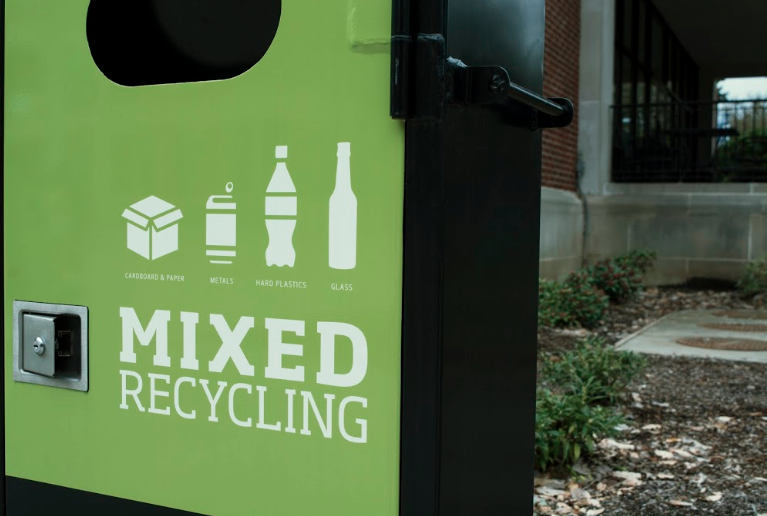Recycling 101
March 6, 2017
Sometimes you finish your drink or empty your roll of paper towels and you’re not sure what to do with it, what can go in the recycling bin and what goes in the trash? Recycling nowadays is extremely important in our effort to protect the environment. In Oregon, it’s illegal to dump electronics in the trash, so what should you do with them when they get outdated? Here is your ultimate guide to recycling.
Electronics.
A disposal ban went into effect in Oregon in 2010, making it illegal to dump unwanted electronics in landfills. So where do those go? If Republic Services is your waste pickup provider, they offer a free recycling center out by their main office on Belvue Street and Walnut Boulevard. There you can drop off unwanted electronics, batteries and a lot of other things that don’t get put in the recycling bin. You can also go there to dump off regular recycling if your bin becomes too full.
Plastic bags.
Plastic bags, like the ones from stores or the ones bread comes in, can’t be recycled with everything else. Because they are so thin and flexible, they get stuck in the machines and people have to stop the line in order to unclog the system. Remember, reusing is better than recycling, you can use them as doggie bags, they can be used to line the smaller trash cans in your house or, if you have enough, you can weave them into a plastic bag shopping bag, how ironic!
If you have no other needs for these bags, save them up and bring them with you on your next shopping trip. Most grocery stores have a spot near the entrance where you can drop off plastic bags to be recycled separately.
What goes in all-in-one recycling?
Despite the misleading title, an all-in-one recycling bin can’t be used for everything, including glass which needs to be put in a separate bin. Republic Services has a list on their website that tells you exactly what can and cannot be recycled. Things that you can recycle that commonly are put in the bin on accident are: Stickers, aluminum foil, ceramic and clothing. Remember to clean out your containers of all leftover food before you throw it in the bin.
What about those plastic numbers?
You’ve all seen those little numbers on the bottom of your soda bottle or yogurt container, but what do they actually mean? There are seven total, so which ones can be recycled and which ones can’t? Here are some common ones you may find:
#1: This means the plastic is made from Polyethylene Terephthalate, or PET. This is the most widely and easily recyclable plastic available. PET is found commonly in many food and body products.
#2: High Density Polyethylene, or HDPE, is the runner up for most easily recycled. You’ll find this one on many laundry detergent containers, milk jugs and shampoo bottles.
#3: You may have heard of PVC pipes, PVC stands for Polyvinyl Chloride. Because of the additives put into this plastic, it is not easily recycled. Make sure you dispose of it properly, PVC is very harmful to humans and the environment during degradation.
You can find the rest of the numbers on this plastics guide by National Geographic.
Motor oil and other hazardous liquids.
Normally, motor oil and other hazardous liquids, like paint and pesticides, can’t be disposed of in the trash bin. Republic Services, and most other disposal companies, allow you to dispose of these in a clear container with a lid smaller than one gallon placed next to your bins; they recommend a milk jug. You can also take them to the same recycle center that you dispose of electronics at.
Kitchen scraps and compost.
Throwing out banana peels and apple cores seems like a waste when they could be used to make fertilizer. In Corvallis, kitchen scraps and composting can be thrown in the same bin that yard debris goes into, how convenient! You can get a small pail like this one to store them in your kitchen before its time to empty it out.
Clothing.
Clothing is a tricky thing to recycle. It can’t be put in your recycling bin, so where does it go? If your clothing is gently used you can bring it to a local thrift shop. If they find it to be good enough, they will resell the clothing to somebody else who needs it and you’ll get a tax deduction.
If your clothing isn’t good enough to be worn again, think about recycling it at a clothing retailer. Stores like HM now offer recycling at their stores, where your clothing will be broken down and the materials will be used to make new clothes.
Living on campus.
What if you live on campus? Oregon State has dedicated an entire section of their website to recycling complete with a recycling guide that contains information about where to recycle things around campus as well as options for those living in residence halls.






